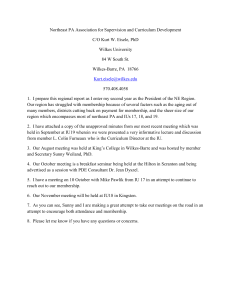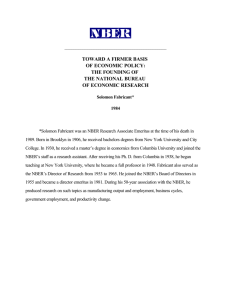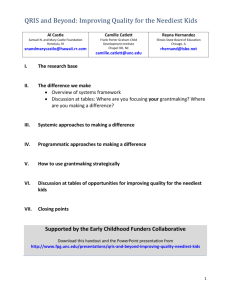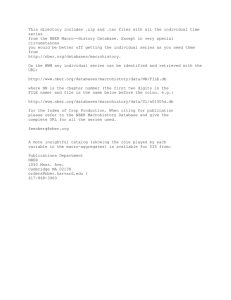description by Stephan Bender, Claudia M. Buch, and Marin Eisele
advertisement
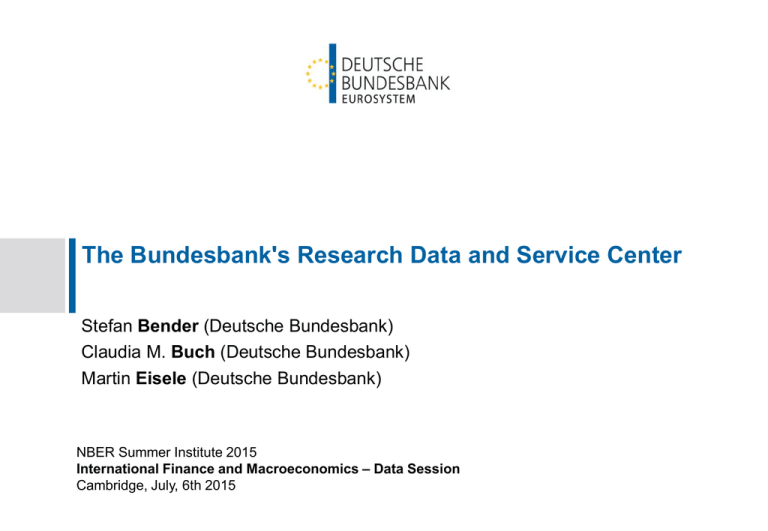
The Bundesbank's Research Data and Service Center Stefan Bender (Deutsche Bundesbank) Claudia M. Buch (Deutsche Bundesbank) Martin Eisele (Deutsche Bundesbank) NBER Summer Institute 2015 International Finance and Macroeconomics – Data Session Cambridge, July, 6th 2015 Overview This presentation is NOT about a specific data set It is about a number of data sets Some of these datasets can be linked The presentation: Relevance of micro-data for central banks Short introduction into the data Data access Conclusion Bender/Buch/Eisele: NBER 2015 7/6/15 Seite 2 Why are micro-data relevant for central banks? In addition to their key task of monetary policy, central banks perform several regulatory and statistical functions. Research shows that key implications of monetary policy can hardly be uncovered using aggregate data: Effects of monetary policy differs across banks, firms, and households. Without taking such heterogeneity into account, the channels through which monetary policy affects prices are difficult to establish. Similar conclusions hold for other policy areas. The risk-taking effects of monetary policy – and thus financial stability implications – cannot be detected without using granular data. Assessing the effects of regulatory policies likewise requires granular data. Bender/Buch/Eisele: NBER 2015 7/6/15 Slide 3 Policy evaluation can make better use of existing datasets. The Bundesbank – like other central bank – produces granular datasets which are highly valuable for policy analysis and research. So far, most of these datasets have been used to provide aggregate statistics and ad hoc analysis of specific policy issues. There is significant knowledge of data and institutional background. Systematic use of these data for policy analysis is often constrained by Time IT-resources Legal restrictions The Bundesbank has launched a large-scale initiative aimed at making better use of existing data both, for policy analysis as well as internal and external researchers. Bender/Buch/Eisele: NBER 2015 7/6/15 Slide 4 Scope of the Bundesbank‘s Research Data and Service Center (RDSC) • The RDSC is part of the Bundesbank internal project Integrated MicroData-based Information and Analysis System (IMIDIAS) • Goals of IMIDIAS: • Support policymaking process • Encourage cooperation with (external) researchers • Promote evidence-based policy-making • Key principles: • Data as a public good • Democratic data access • Data protection Bender/Buch/Eisele: NBER 2015 7/6/15 Slide 5 Selected Bundesbank datasets ❙ Banks • Monthly balance sheets statistics (BISTA) • External position of banks • Quarterly borrowers statistics • MFI interest rate statistics (MIR) ❙ Banking supervision • Prudential information system (BAKIS) • Large credit micro data base (MiMiK) ❙ Securities • Securities Holdings Statistics Bender/Buch/Eisele: NBER 2015 7/6/15 Slide 6 ❙ Enterprises • Microdatabase Direct Investment (MiDi) • Statistics on International Trade in Services (SITS) • Corporate balance sheets (Ustan) ❙ Households • German Panel on Household Finances (PHF) Microdata: Banks I Monthly balance sheet statistics (BISTA) • Domestic banks' assets and liabilities (monthly) External positions of banks • Assets and liabilities of banks in Germany and their foreign branches and subsidiaries vis-à-vis non-residents. • Input for the BIS Banking Statistics Banks' loans to enterprises and households in Germany (BISTA) • Break down by sector, quarterly borrowers statistics Bender/Buch/Eisele: NBER 2015 7/6/15 Seite 7 Microdata: Banks II The MFI interest rate statistics (MIR) • Sample of around 240 institutions. • Interest rates applied by domestic banks (MFIs) and the corresponding volumes for euro-denominated lending and deposit business with households and non-financial corporations in the Euro Area. Bender/Buch/Eisele: NBER 2015 7/6/15 Seite 8 Microdata: Enterprises I Annual statistics on foreign direct investment stocks (MIDI) • Since 1976, in accordance with the provisions of the Foreign Trade and Payments Regulation • Affiliate-level panel data available since 1996 Germany’s Statistics on International Trade in Services (SITS) • Part of the Balance of Payments (BoP) Statistics • Information on international service transactions carried out by German residents that exceed €12,500. Bender/Buch/Eisele: NBER 2015 7/6/15 Seite 9 Microdata: Enterprises II Financial statements of non-financial companies (Ustan) • Originates from Bundesbank’s refinancing activities • Information on earnings and financing (1987 to 2011). Bender/Buch/Eisele: NBER 2015 7/6/15 Seite 10 Several (international) research networks draw on Bundesbank micro data International Banking Research Network (IBRN) http://www.newyorkfed.org/IBRN/index.html MiDi informal network (annual workshop) ECB activities: • Household data: PHF is part of the European household panel. Competitiveness Research Network (CompNet) https://www.ecb.europa.eu/home/html/researcher_compnet.en.html Bundesbank’s RDSC will be part of the German data infrastructure (German Data Forum; RatSWD) Bender/Buch/Eisele: NBER 2015 7/6/15 Slide 11 Tasks of the Research Data and Service Center (RDSC) The RDSC offers access for non-commercial research to (highly sensitive) micro data of the Bundesbank: Generate (linked) micro data Offer advisory service on data selection and data access (data handling, research potential, scope and validity of data) Provide data access and data protection Document data and methodological aspects of the data Work on own research projects (in close cooperation with the Bank’s business areas and the Research Centre) Organize conferences and workshops Bender/Buch/Eisele: NBER 2015 7/6/15 Slide 12 Other services provided by the FDSZ Software available: Stata, SAS Additional software: MatLab, Gauss Disclosure review service Documentation in English Advisory service and assistance Bender/Buch/Eisele: NBER 2015 7/6/15 Seite 13 Data access in Research Data Centers (RDCs) Data Producers Survey studies Official statistics Bender/Buch/Eisele: NBER 2015 7/6/15 14 Research Data Center Data users Modes of Data Access Off-Site Access Email, encrypted (Scientific Use File) Factually anonymous On-Site Access Remote Execution (near future) Weakly anonymous (= confidential) Output control Bender/Buch/Eisele: NBER 2015 15 7/6/15 Guest Stay Factsheet on the RDSC The RDSC has started in 2014 as part of the Statistics Department of the Bundesbank. It continues tasks formerly performed by the Research Center: Screening project applications Granting access to micro data Performing output control 120 active projects, 10 employees (increasing), 12 working places for guest researchers Bender/Buch/Eisele: NBER 2015 7/6/15 Slide 16 That‘s what it looks like (1) Location: 20th floor of the TrianonTower in Frankfurt (near the main railway station) Bender/Buch/Eisele: NBER 2015 7/6/15 Seite 17 That‘s what it looks like (2) Bender/Buch/Eisele: NBER 2015 7/6/15 Seite 18 Summing Up Accessing data through a RDSC/RDC is the best way for using highly sensitive data like Bundesbank’s data. The Bundesbank hopes to (further) stimulate international research and policy analysis with these data. Accessing the data is comparatively easy and inexpensive. Come, visit us in Frankfurt! Website: www.bundesbank.de\fdsz Contact: fdsz@bundesbank.de Bender/Buch/Eisele: NBER 2015 7/6/15 Seite 19 How to access the data Application form, expose and CV are needed to get an approval by the RDSC. Non-commercial research only. Micro data are available only via a guest stay (on-site). Exception: SUF of the German PHF-study (data will be send in an encrypted email). 12 working places for guest researchers without any external interface (internet, CD, USB). Remote execution is planned. Because of the complexity of the data, a guest stay in advance is required. Bender/Buch/Eisele: NBER 2015 7/6/15 Slide 20
